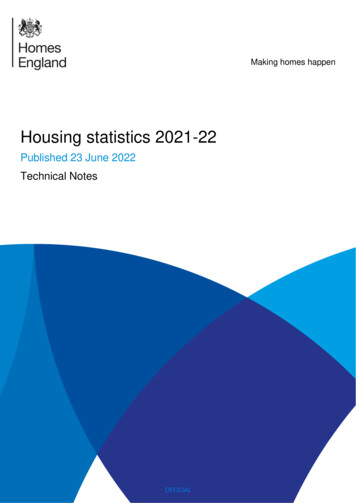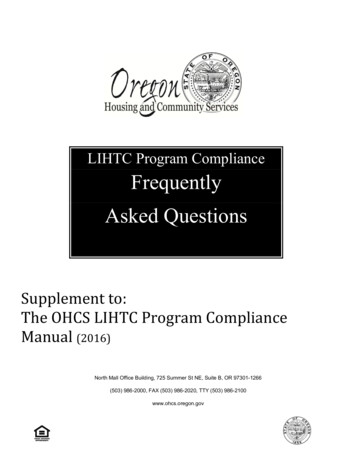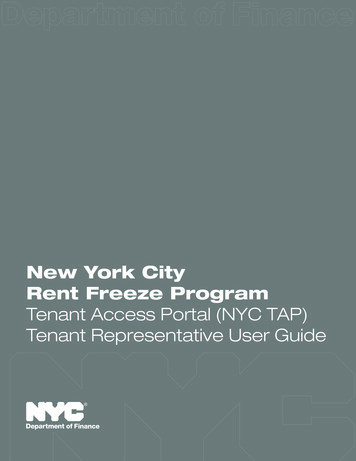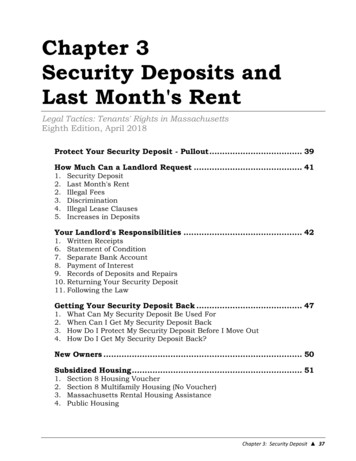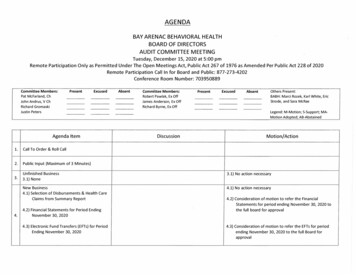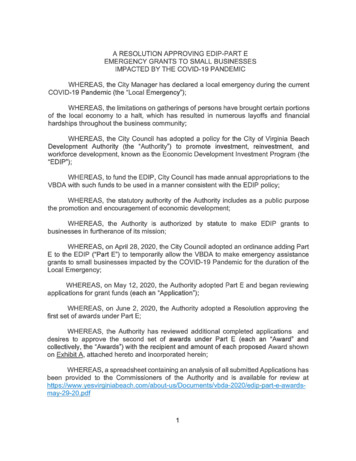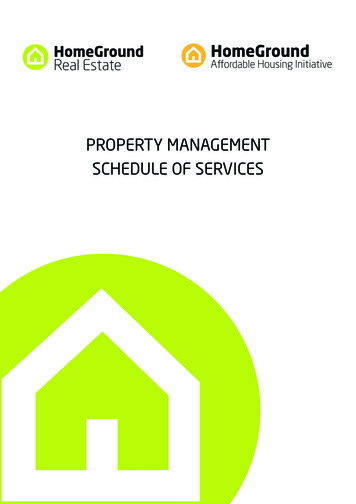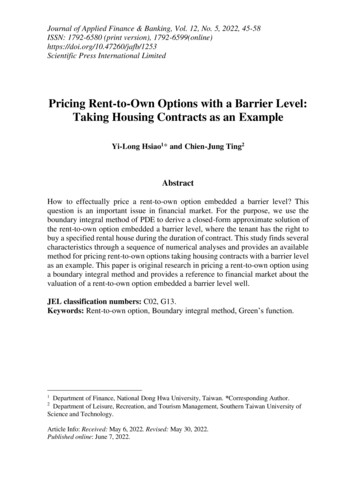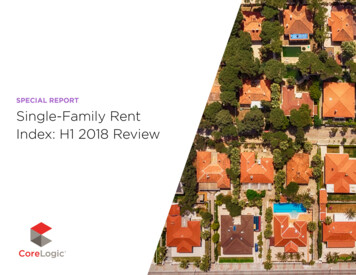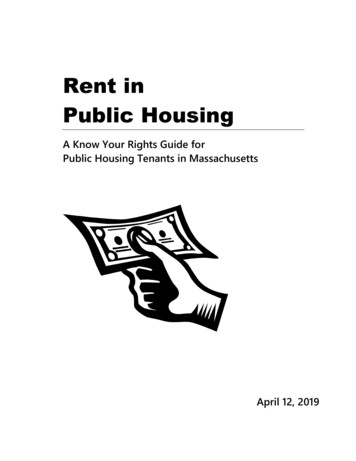
Transcription
Rent inPublic HousingA Know Your Rights Guide forPublic Housing Tenants in MassachusettsApril 12, 2019
Acknowledgments:This booklet was produced by the Annette Duke and Amy Copperman atMassachusetts Law Reform Institute. We would like to thank the following for theirassistance with the original version: Mac McCreight of Greater Boston LegalServices; Susan Hegel of Cambridge and Somerville Legal Services, an office ofGreater Boston Legal Services; Legal Assistance Corporation of CentralMassachusetts’s LiveJustice Project; the Massachusetts Union of Public HousingTenants; the Institute for Community Inclusion; members of the statewide legalservices Housing Coalition; Jeff Wolf of Massachusetts Law Reform Institute; DanBartley of Greater Boston Legal Services; Gale Halpern of Massachusetts LawReform Institute; and Russell Constantine of Harvard Law School.In addition, we would like to thank the following people for their assistance withupdates for the September 2009 edition: Mac McCreight, Susan Hegel, and BarbaraZimbel at Greater Boston Legal Services and Kate Watkins a law student at Mass.Law Reform Institute. A further update was done by Mac McCreight, Annette Duke,and Susan Hegel in April 2019.Because laws and regulations change, make sure you have the most up-to-dateversion of the booklet by checking ate of publication: April 12, 2019 (Edition 2, Revised)2
3
Table of ContentsHow to Calculate Rents . 101. If I live in public housing, how is my rent calculated? . 102. Is my rent always based on my income? . 123. What is counted as income?. 144. What is NOT counted as income? .165. What household expenses must be deducted before setting rent? . 20Special Issues . 236. What if I have high medical costs? . 237. If I get child support, will it be counted towards my rent? . 258. When are lump sum amounts not counted towards rent? . 269. Are assets counted as income? . 2710. If I pay for any utilities, does that affect my rent? . 2811. If I have no income, can I be charged rent? . 3012. If I work and my rent increased a lot, what can I do? . 31Trouble Paying Rent . 3313. If I cannot afford my rent this month, what can I do? . 3314. What if I pay my rent late? . 34Income Changes . 3515. When must I report changes in my household’s income? . 3516. If my income goes up and I do not report this right away,can I get in trouble?. 374
17. What should I do if my income changes a lot during the year? .3818. Can the housing authority retroactively increase my rent? . 3919. What kind of notice am I supposed to get about a rent increase? . 4020. When can I ask for a decrease in rent? . 4121. When should a rent decrease take effect? . 4222. What if I told the housing authority that my income went down,but they did not lower my rent? . 4323. What papers do I need to prove my income? . 44Family Changes . 4524. When do I report changes in my family? . 4525. How can I add someone to my household?. 4526. How do I remove someone from my lease? . 4727. If my housing authority says I am overhoused,what can happen to my rent? .4828. Are there rules about being over-income for continued occupancyin public housing? . 49Mixed Finance Housing . 5029. What is Mixed Finance housing? . 5030. How are rent rules different for Rental Assistance Demonstration(RAD) than for Public Housing? . 5131. How are rent rules different for the regular Section 8 Housing ChoiceVoucher Program (HCVP) than for Public Housing? . 5232. How are rent rules different for the Mass. Rental Voucher Program(MRVP) than for Public Housing? . 535
33. Does recertification work differently for Mixed Financethan for Public Housing? . 5434. Are the over-income rules different for RAD, Section 8,and MRVP than for Public Housing? . 5535. Is there a different way to dispute rent or eligibilityfor Mixed Finance than for Public Housing? . 5636. Are there some “affordable units” in Mixed Finance housing that maynot get the benefit of public housing or Section 8/MRVP rent rules? . 57Sample Letters . 5837. Sample Rent Freeze Letter: Federal Public Housing. 5938. Sample Rent Freeze Letter: State Public Housing . 60Glossary . 616
If you are a tenant in public housing inMassachusetts, this booklet will give you answersto questions about how rents are set in both stateand federal public housing. In addition, if you areliving in public housing that is undergoingredevelopment so that you will no longer be inpublic housing, but in a mixed finance site withother types of subsidies, this explains how rentsmay change.Also included is a glossary. Words that areitalicized are in the glossary.Please share this booklet freely with tenants,housing authorities, and organizations workingwith tenants. It is available g7
Keep in Mind: Legislation passed by Congress in2016 made major changes to how rents are set infederal public housing and Section 8, but HUD hasnot yet issued or implemented regulations for all ofthose changes. Check www.MassLegalHelp.org forthe most up to date information.8
9
How toCalculate Rents1.If I live in public housing,how is my rent calculated?Usually, rent in public housing is a percentage of your anticipated yearly income.This is called income-based rent because it is based on your income. (See Question 2for other ways that rents are set.) The way that income-based rent is set is: You give the housing authority information about the income you anticipatecoming into your household for the coming 12 months. The housing authority then subtracts certain deductions and arrivesat an amount called your net income (for state public housing)or adjusted income (for federal public housing). The housing authority then determines your rent based on a percentage of your netor adjusted income.The exact percentage depends on whether you live in state or federal public housing.If you do not know whether you live in state or federal public housing, ask yourmanager or check your lease.State public housingFor elderly/disabled public housing, your rent will be the following: If you pay no utilities separately, rent 30% of your net income If you pay some or all utilities, rent 25% of your net incomeFor family public housing, your rent will be the following: If you pay no utilities, rent 32% of your net income If you pay some, but not all, utilities, rent 30% of your net income If you pay all utilities, rent 27% of your net income.110
Federal public housingIf you live in any kind of federal public housing, you generally pay whichever ismore: 30% of adjusted income or 10% of annual income.2 Most tenants pay 30% ofadjusted income.3 If you pay utilities, then a utility allowance is subtracted from thismonthly amount.Find more information about rent in federal public housing at the U.S. Housing andUrban Developments (HUD) website ip/faq gird.cfm11
2.Is my rent alwaysbased on my income?No. There are some situations in both state and federal public housing where the rentis not going to be a percentage of your income. (Note: If you live in federal publichousing in Cambridge and Holyoke, the housing authority has received specialpermission to create its own rules about how to set rents.5)Federal public housingMinimum rentIn federal public housing, housing authorities can charge a minimum rent of 0- 50per month. For more information, see Question 11.Flat rentIn federal public housing, housing authorities must establish a maximumflat rent for each apartment.6 This will vary by bedroom size, condition, location, ageof the unit, and other factors. Make sure you know what the flat rent is for yourapartment. You will have a choice of paying either 30% of income or the flat rent. Ifyou have a high income and the flat rent is less than 30% of your household’sincome, you should choose the flat rent. If you are paying the flat rent and at any timeyou are unable to pay that amount because of a financial hardship, you can ask toreturn to an income-based rent.7 If you choose a flat rent, the housing authority mustre-examine your income at least once every three years.A number of years ago, some housing authorities set fairly low flat rents. Starting in2014, Congress required that generally the flat rent had to be at least 80% of theSection 8 Fair Market Rent (FMR) for the area. The FMRs are revised every year,and usually increase, but not always. If there is a change in the FMRs, housingauthorities must revise their flat rents.HUD also provides that if the flat rent has been lower than 80% of FMR, the increasein the flat rent for a household can be phased in over three years so that the increasedoes not exceed 35% in any given year.8Pro-rated rent and immigrantsIf you live in federal public housing and your household includes immigrants who arenot U.S. citizens or who are not eligible noncitizens (as defined by federal regulation),the family usually must pay a pro-rated rent.9 This figure is often much higher thanthe regular rent.10 For more information about pro-rated rent, see Legal Tactics:Finding Public and Subsidized Housing, Booklet 9 (Question 9) atwww.MassLegalHelp.org/housing.12
Welfare sanctions and rentIf you live in federal public housing and your Transitional Aid to Families withDependent Children (TAFDC) grant was lowered because the Department ofTransitional Assistance sanctioned you for welfare fraud or for not doing its requiredwork program, your public housing rent will not be lowered.11State public housingMinimum rentIn state public housing, there is a minimum rent of 5 a month.12 For moreinformation, see Question 11.Overhoused family that refuses a transferIn state public housing, if a family is overhoused, which means that the apartment isdesigned for a larger family, the housing authority is required to transfer this familyto an appropriately sized apartment.13For example, if a3-person family is living in a 4-bedroom apartment, a housing authority can requirethem to transfer to a smaller unit.If the family refuses to transfer to an available apartment, the housing authority isallowed to charge 150% of the income-based rent.14 This means that if the householdwould have paid 300 per month under the regular income-based rules, the housingauthority can charge 450 until the family agrees to move to a smaller unit. SeeQuestion 27.For more about transfer, see Transfers in Public Housing: A Know Your RightsGuide, available at www.MassLegalHelp.org/housing/transfers.13
3.What is counted as income?In state public housing, the income that the housing authority counts when calculatingyour rent is called gross income.15 In federal public housing it is called annualincome.16 While the rules about what is counted are slightly different for state orfederal public housing, there are also many similarities.Both state and federal public housingBoth state and federal public housing count the following as income:Income from work: Wages, salaries, tips, overtime pay, commissions, fees,and bonuses.Income from business: Net business income if self-employed or if income isfrom a business or profession.17Income from assets: Income from property, such as rent, dividends, interest,capital gains, or trust income. For more information about assets, see Question9.Social Security or Veterans Affairs (VA) disability periodic payments:Supplemental Security Income (SSI), Social Security Disability Income(SSDI), or Retirement, Survivors and Disability Insurance (RSDI), or VAdisability benefits. Important: One big difference between state and federalhousing is if you receive a deferred amount from SSI or SSDI (generally in alump sum), it is counted as income in state public housing, but not in federalhousing. VA deferred disability benefits are now treated by HUD the sameways as SSI and SSDI.18 See Question 8.Government benefits: Transitional Aid to Families with Dependent Children(TAFDC) or Emergency Assistance to the Elderly, Disabled and ChildrenProgram (EAEDC) benefits.Payments to replace earnings: Unemployment compensation, workers’compensation, disability insurance or benefits.Periodic, regular allowances: Alimony, separate support, child support.Other payments: Annuities, retirement funds, pensions, death or disabilitybenefits, insurance policies, or other similar types of periodic payments.Regular gifts or contributions: From someone not living in the apartment.1914
State public housing onlyIf you live in state public housing, the following additional incomeis counted when determining your rent:Lottery and gambling winningsFoster care paymentsPrincipal from a trustTaxable capital gainFederal public housing onlyIf you live in federal public housing, the following additional income is countedwhen determining your rent:Severance payImputed welfare income for certain sanctions:The amount of income not received by a family as a result of a welfare benefitreduction for certain sanctions (See Question 2)15
4.What is NOT counted as income?Both state and federal public housing have rules stating that certain income should beignored, or excluded, when determining your rent. These are called exclusions.Exclusions are not counted when calculating your gross or annual income.Both state and federal public housingIf you live in either state or federal public housing, the following income is notcounted when calculating rent:20Regular payments from Food stamps, Fuel assistance,21 Payments under the SSI PASS (Plan for Achieving Self-Support)Program, Payments under the Domestic Volunteer Services Act of 1973.Certain one-time (or lump sum) payments Irregular gifts, inheritances, life insurance proceeds Payments from insurance, worker’s compensation, or court judgmentsor settlements that compensate for loss or personal injuryEarnings of the following people Minors, Live-in attendants for person with a disability, Members of armed forces in a war zone.Earned income tax credit refundsPayments received to compensate for medical care and expenses22Return of capital:A return of all or some of your original investment from sale or transfer of thatinvestment.Payments from the government later reimbursed to the government:For example, if you receive SSDI benefits of 800/month, but the SocialSecurity Administration deducts 50/month to for an earlier overpayment, thenyour rent is based on 750/month SSDI.16
State public housing onlyIf you live in state public housing, the following income is not counted:Compensation for income lost when tenant was not living in public housing(including lump sum payments).Relocation payments from state or federal relocation funds.Education-related payments:Scholarships or stipends for housing paid by a non-household member (forfull-time or part-time students).Training:Payments associated with training for employment programs to cover costssuch as transportation, fees, books, or child care during training. (This does notapply to wages from on-the-job training.)Earnings of the following people: Full-time student 18-25 years old (who is not head of household orspouse). A senior (over 62) working over 20 hours per week at minimum wage.23 People who started working who received government cash assistancefor 12 months before working. See Question 12.Veterans: Amounts paid to a veteran for tuition or other costs. All but 1,800 received from federal government by unemployabledisabled veteran (discretionary).17
Federal public housing onlyIf you live in federal public housing, the following income is not counted:Deferred Social Security and Veteran’s Affairs (VA) disability: Deferredpayments from SSI and SSDI and VA disability that are either lump sumpayments or in prospective monthly amounts. (While this amount is notcounted as income, it becomes an asset. See Questions 8 & 9.)Property tax rebates and capital gainsRegular payments: Foster care for children or adults; Adoption assistance payments over 480; First 200/month of a resident stipend (includes residentcommissioners); Payments to crime victims; Certain payments from federal programs: AmeriCorps, Job TrainingPartnership Act, Workforce Investment Act, the Child Care &Development Block Grant Act, the Older Americans Act of 1965(senior aide program); Reparations for persecution during Nazi era; Certain repayments to Native Americans.Education-related payments: Certain assistance or work-study paid to student or the institution HUD-funded training programs Incremental earnings when participating in an employment trainingprogram.Welfare-related payments: Reimbursements of out-of-pocket expenses(clothing, special equipment, transportation, child care) in order to participatein specific training programs.Medical-related payments: Payments by a state agency to a family memberwith developmental disability for costs of services or equipment to keep familymember at home.Medicare: Any subsidy received to assist low-income people in paying forMedicare prescription drug plan costs.24Earnings of the following people: Full-time student earning more than 480 who is over 18 (and not headof household or spouse),18
People who start working who meet certain requirements. SeeQuestion 12.Veterans: Deferred disability benefits from the Department of VeteransAffairs (generally received as a lump sum).2519
5.What household expenses mustbe deducted before setting rent?Before a housing authority sets your rent, it is required to subtract fromyour household’s gross or annual income certain deductions.In general, state public housing has more deductions than federal publichousing. While housing authorities can adopt additional deductions for federalpublic housing, they cannot add to the deductions listed below for state publichousing.26For example, Boston Housing Authority allows a deduction of extraordinarymedical expenses for all families in federal public housing—not just forelderly or disabled families living in federal public housing. SomervilleHousing Authority has deductions for certain part time students and for youngworking adults.To see if your housing authority has adopted additional deductions for federalpublic housing, ask your manager or check your housing authority’sAdmissions and Continued Occupancy Policy document.27Federal public housingIf you live in federal public housing, you are entitled to the followingdeductions before your rent is set (be aware that Congress authorized somesignificant changes in deductions in 2016, but those changes have not yet beenimplemented, and won’t be until HUD issues new regulations):28Elderly and Disabled Family Deduction 400 per year for a family where the head of the household or spouse is62 years of age or older or is a person with a disability.Dependent Deduction 480 per year for each dependent. This includes anyone who is: Under the age of 18, A full-time student, or A person with a disability.Medical or Disability DeductionThe amount over 3% of your annual income which you are likely to spendon unreimbursed medical expenses only for a family member who is 62 orover or who has a disability. Includes unreimbursed out-of-pocket costs forprescription drugs and medical insurance premiums.29
The amount over 3% of your annual income which you likely to spend onunreimbursed expenses for disability assistance for any family member witha disability which are necessary for that person’s employment. This includesattendant care and auxiliary apparatus.30For more information about medical bills see Question 6.Child Care DeductionChild care payments for children under age 13, if a family member isemployed, looking for employment, or in school.31State public housingIf you live in state public housing, you are entitled to the following deductionsbefore your rent is set: 32Elderly and Disabled Family Deduction 400 per year for a household living in family public housing where theperson who signed the lease is either 60 years or older or has a disability(unless the household is overhoused).Family Deductions 300 per year for each child under 18. 300 per year for each adult who has income (other than head ofhousehold), if that adult’s gross income exceeds all his or her otherdeductionsHeat DeductionA yearly heat deduction where tenant pays heat. The amount of thededuction is determined by the Department of Housing and CommunityDevelopment (DHCD).33Medical DeductionActual payments for necessary medical expenses not covered by insurancefor any family member (including co-payments and insurance premiums) inexcess of 3% of gross household income.34Child and Family Care DeductionPayments for care of children or sick or incapacitated household members ifnecessary for employment of another household member.Support If Separated or DivorcedChild support or separate support, or alimony paid as a result of a court orderto someone not living in the household.21
Education DeductionNon-reimbursable payments for tuition and fees for post-secondaryeducation for household member who is not a full-time student.Deductions for People with Disabilities Non-reimbursable payments for reasonable and necessary housekeepingand personal care. Certain travel expenses in connection with necessary activities whichcannot be performed by another household member.3522
Special Issues6.What if I have highmedical costs?If you have high medical expenses, you may be entitled to deduct theseexpenses from your income before your rent is determined. To do this youwill need to keep very good records about your medical expenses—what youhave paid and what you anticipate paying.If an unanticipated major medical expense comes up during the course of theyear, let the housing authority know as soon as possible so that a rentadjustment can be made. See Question 20.Deductible medical expenses include: Payments or co-payments for services of doctors or other health careprofessionals;Hospitalization, clinic, or treatment costs;Medical or dental insurance premium costs;Out-of-pocket prescription drug costs and costs of non-prescriptionmedicines which are doctor recommended;36Costs for dental care/work, eyeglasses, hearing aids (includingbatteries), special footwear which is medically required;Transportation to medical treatment (including parking and IRSmileage to and from the medical appointment);37Live-in or periodic medical assistance at home;Monthly payments on accumulated medical bills;Payments for auxiliary apparatus such as wheelchairs, walkers, ramps,lifts, scooters, reading devices for people with visual disabilities,equipment to add to cars and vans for people with disabilities, orexpenses associated with service or assistance animals.38Bills which are paid or reimbursed by third parties (such as Medicaid orMedicare) are not deductible.Federal public housingIf you live in federal public housing, you are allowed to deduct the amount ofmedical expenses that are over 3% of your annual income which you arelikely to have, but only for a family member who is 62 or over or a familymember who has a disability.39 The best way to show the housing authoritywhat your medical expenses may be in the coming year is to bring in your23
medical bills from the past year. Make sure that you do not submit the samemedical bill twice.Note: The housing authority in Boston has established a deduction forextraordinary medical expenses for all families in federal public housing, notjust for elderly or disabled families.In addition, if you live in federal public housing, you are allowed to deductunreimbursed expenses related to the care of a disabled family membernecessary to allow another family member to work. This can include the costof attendant care or auxiliary apparatus. Only the portion which exceeds3% of annual income is deductible, and the deduction may not exceed theemployment income of the family member who would otherwise be availableto provide this care. If this amount by itself does not exceed 3% of yourannual income, it can be combined with the medical expense deduction listedin the previous paragraph.40State public housingIf you live in state public housing, you are allowed to deduct the amount youhave actually spent on unreimbursed medical expenses for any familymember in an amount that is over 3% of your gross income.41In addition, households living in family housing in which a tenant is elderly orhas a disability are permitted a yearly household deduction of 400.42 Thisdoes not apply if you live in elderly/disabled housing. It also does not apply ifyou are overhoused in family housing.Finally, if a household member has a disability, payments for reasonable andnecessary housekeeping or personal care services may be deducted. Thisapplies to both family and elderly/disabled housing.24
7.If I get child support, will it becounted towards my rent?Yes. In general, all child support that you receive, whether through a courtorder or by informal arrangement, will be counted as income for purposes ofcalculating your rent.If you stop getting child support, ask the housing authority to lower your rentas soon as you stop receiving the support. See Question 20. For example, ifpart or all of the child support you received is going directly to theDepartment of Transitional Assistance (DTA) because you receive TAFDC,let the housing authority know so that your child support is not counted twice.If you stop receiving TAFDC and start getting child support you should alsolet the housing authority know right away.Often, there is a problem as to how to verify the loss of the child support. Thebest way to show the loss of child support for your family is through theMassachusetts Department of Revenue’s Child Support Enforcement (CSE)Division. The CSE tracks almost every child support payment made in thestate, whether through income assignment or otherwise.You can get information regarding your payment history at the followingwebsite: You will need a security code, or a PIN (Personal Identification Number), toget into your account. Once you gain access to your account, you will be ableto see the payment history, which you should print out and bring to thehousing authority. If you do not have access to the Internet, you can requestpayment history by calling CSE’s Voice System at 800-332-2733. Moreinformation about CSE is available at www.cse.state.ma.us.Sometimes families get informal child support, either instead of a court orderor in addition to a court order. Typically these payments will be consideredincome if they can be considered regular gifts coming into the household.For example, if the non-custodial parent is regularly giving you 100 in cashto help with the kids, the housing authority can count that as income. But ifthe other parent only occasionally buys your children clothes, that is likely tobe seen as a sporadic gift and will not be counted.25
When are lump sum amountsnot counted towards rent?8.A lump sum is a one-time payment. When a housing authority calculates yourrent, some lump sum amounts are not counted as income. Lump sum amountsthat are not counted as income are still considered assets and the interestearned on them in future years will be counted as income. For more aboutassets, see Question 9.If you live in federal or state public housing, the following lump sumpayments are not counted as income in the year received when determiningrent: Irregular gifts, inheritances, life insurance proceeds Payments from insurance, worker’s compensation, or court judgmentsor settlements that compensate for loss or personal injury Returns on investments (return of capital).Federal public housingIf you live in federal public housing, the following types of lump sumpayments are also not counted as income when determining rent: Deferred periodic payments from SSI and SSDI, or deferred periodicVeterans Affairs (VA) disability payments.4326
Are assets counted as income?9.In general, if something is considered an asse
apartment. You will have a choice of paying either 30% of income or the flat rent. If you have a high income and the flat rent is less than 30% of your household's income, you should choose the flat rent. If you are paying the flat rent and at any time you are unable to pay that amount because of a financial hardship, you can ask to
